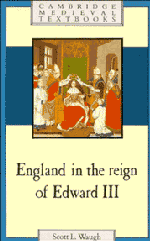Book contents
- Frontmatter
- Contents
- List of figures and tables
- Acknowledgements
- Map 1 Towns and villages mentioned in Chapters 3–6
- Map 2 Ecclesiastical sites mentioned in Chapter 9
- Part I Overview
- Part II Economic challenges
- Part III Government and communities
- Part IV Politics
- 12 Negotiating consent: council and parliament
- 13 Political conflict
- 14 Conclusion
- Glossary
- Bibliography
- Index
14 - Conclusion
Published online by Cambridge University Press: 05 June 2012
- Frontmatter
- Contents
- List of figures and tables
- Acknowledgements
- Map 1 Towns and villages mentioned in Chapters 3–6
- Map 2 Ecclesiastical sites mentioned in Chapter 9
- Part I Overview
- Part II Economic challenges
- Part III Government and communities
- Part IV Politics
- 12 Negotiating consent: council and parliament
- 13 Political conflict
- 14 Conclusion
- Glossary
- Bibliography
- Index
Summary
In some ways, it was unfortunate that Edward lived as long as he did. For one whose triumphs were so striking, Edward's end was singularly ignominious. By the time of his death in 1377 at the age of sixty-five, the glorious years of his reign had long passed. The last years were engulfed in controversy. In the dispute over Alice Perrers and the courtiers, Edward was portrayed as a victim, not the forceful leader he once was. Depicting Edward's lonely death, the Chronicon Angliae captures the sadness of a leader whose time had passed. Deserted by his mistress as well as the knights and squires who had served him, Edward was comforted in his final moments by only a single priest. Another chronicle drew the lesson, saying that before his final years Edward had ruled gloriously and won great victories over the French and Scots, while his people lived in peace and prosperity. But at the end, in the manner of Solomon, his heart was infatuated by women, his body weakened and even annihilated. The poem ‘On the Death of Edward III’ likewise sensed the passing of an era. It likened the chivalry of England to a stout ship, with Edward the rudder, prince Edward the helmsman, and the commons the mast. When rudder and ship were united, there was nothing that they could not accomplish, but now, bereft of Edward and his son, England could only hope that the young Richard would prove as capable a leader as his father and grandfather had been. Brinton, too, lamented Edward's death and the passing of powerful men and captains.
- Type
- Chapter
- Information
- England in the Reign of Edward III , pp. 230 - 236Publisher: Cambridge University PressPrint publication year: 1991

